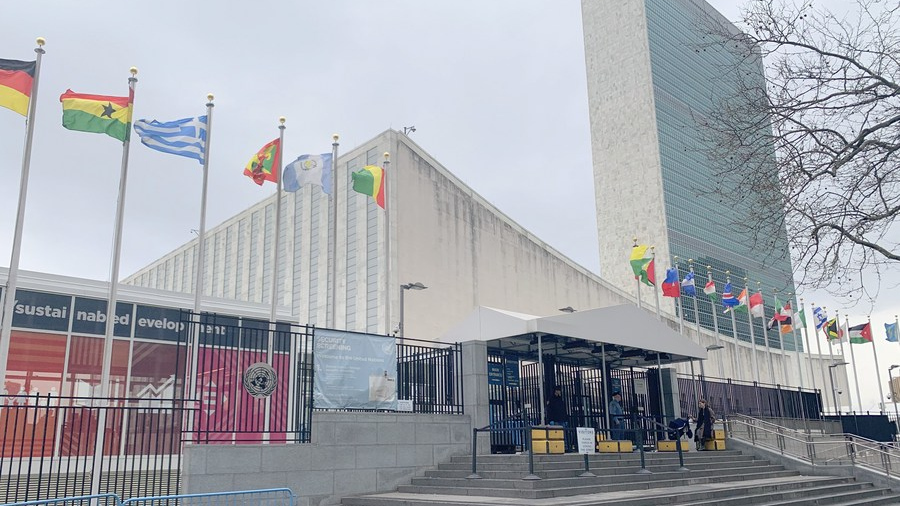Wang Yi, a member of the Political Bureau of the CPC Central Committee and director of the Office of the Foreign Affairs Commission of the Communist Party of China Central Committee, meets with Amina Mohammed, Deputy Secretary-General of the United Nations, Beijing, capital of China, June 29, 2023. /Xinhua
Wang Yi, a member of the Political Bureau of the CPC Central Committee and director of the Office of the Foreign Affairs Commission of the Communist Party of China Central Committee, meets with Amina Mohammed, Deputy Secretary-General of the United Nations, Beijing, capital of China, June 29, 2023. /Xinhua
Editor’s note: Hannan Hussain is a foreign affairs commentator, author and assistant research associate at the Islamabad Policy Research Institute. The article reflects the author’s opinions and not necessarily the views of CGTN.
Wang Yi, director of the Office of the Foreign Affairs Commission of the Communist Party of China Central Committee, met with United Nations Deputy Secretary-General Amina Mohammed in Beijing on June 29. During their exchange, Wang reaffirmed China’s support for UN centrality in international affairs.
As a founding member of the global organization, China remains firm in its advocacy for genuine multilateralism, and is keen to limit socioeconomic inequalities disadvantaging the Global South. Heightened prospects of China-UN collaborations in sustainable development, climate change, digital innovation, and human rights mark a major step towards equitable and enduring world peace.
Consider Beijing’s readiness to deepen collaboration with all UN agencies in support of the 2030 Sustainable Development Agenda. China continues to advance representation of the Global South through an expanded BRICS and its flagship Belt and Road Initiative (BRI), providing flexible financing for low income countries and increasing capacities of Sustainable Development Goals (SDGs) in dozens of African countries. In a nod to UN goals, the BRI continues to support a large number of developing countries in their transition towards green development, seen by the UN as a critical technological frontier with an estimated value of $9.5 trillion by 2030.
The UN has already warned that the benefits of such a transition are heavily skewed in favor of the wealthiest nations, underlining the importance of adhering to more “multilateral partnerships” with China to help achieve the SDGs.
As the largest developing country, Beijing fully recognizes the value of leading from the front on universal human rights and gender equality. At the ongoing 53rd UN Human Rights Council session, China echoed calls from nearly 80 countries to promote solidarity rather than division in our response to distinct human rights challenges.

The visitors’ entrance to UN headquarters in New York, the U.S. /Xinhua
The visitors’ entrance to UN headquarters in New York, the U.S. /Xinhua
Similarly, Beijing’s multidimensional view of human rights has also informed profound gains against extreme poverty, particularly for a country that accounts for nearly a fifth of the global population, according to Aslan Abashidze of the UN Committee on Economic, Social and Cultural Rights. Given such merits, Mohammed’s visit to China opens up new horizons for substantive UN development cooperation with China, including through the active involvement of over 650 Chinese businesses in the UN Global Compact on human rights, labor, environment and anti-corruption. “In the face of many global challenges, we must adhere to multilateral partnerships and look to China for leadership to jointly find solutions,” Mohammed told Wang.
Amid looming recession risks, growth uncertainty and recurring conflicts, it is also pivotal for UN and China to deepen agency partnerships and address deficits in peace, development and governance. The China-led Global Development Initiative (GDI) is a striking illustration of shared progress. UN has actively supported GDI’s South-South Cooperation Fund, a resource pool that enables countries to overcome financing woes and bring down barriers to sustainable development targets. As both sides look to build on global climate action, China’s backing for an international clean energy partnership is a testament to its fight against existential crises.
Interestingly, the UN’s central role in international affairs also merits collective and sincere recognition by all states. Thursday’s exchange underlined the value of upholding basic norms of international relations under the UN Charter, which in turn are key to a single standard of justice, fairness and representation for the developing world. For its part, China has contributed over 50,000 peacekeepers to UN operations over the past three decades, and continues to contribute to UN conflict resolution efforts in major conflict hotspots, from Sudan to Ukraine.
It is thus impossible to understate the value such actions place on a strong and robust UN role in international affairs. More prospects for “strengthened cooperation” with Beijing in a range of fields make that point even clearer: that China-UN partnerships are consequential for the future of world peace.
(If you want to contribute and have specific expertise, please contact us at opinions@cgtn.com. Follow @thouse_opinions on Twitter to discover the latest commentaries in the CGTN Opinion Section.)
Credit:Source link




